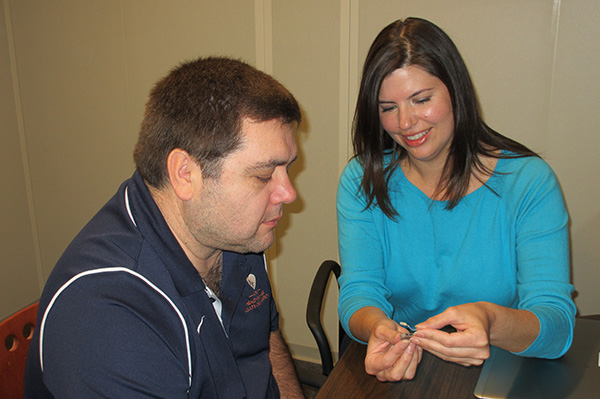2013 New Century Scholars Research Grant, 2008 New Century Scholars Doctoral Scholarship
Dreaming Big
 Jamie Desjardins is dreaming a big dream. She wants to improve the lives of all people with hearing loss. Like the ASHFoundation itself, which granted her a New Century Scholars Award in 2013, Desjardins is certain that in her inspiring dream is the promise of great possibilities.
Jamie Desjardins is dreaming a big dream. She wants to improve the lives of all people with hearing loss. Like the ASHFoundation itself, which granted her a New Century Scholars Award in 2013, Desjardins is certain that in her inspiring dream is the promise of great possibilities.
When Desjardins, an assistant professor at the University of Texas at El Paso, talks about improving the lives of people with hearing loss, she means a lot more than just bettering their hearing. She is well aware that "hearing aid use is a proven intervention to alleviate some of the negative effects of Presbycusis" but she is equally aware that "the impact of hearing aid use in cognitive function remains unclear." She is aiming to prove that hearing aid use can actually improve cognitive processing mechanisms at the level of the central nervous system.
It's known that hearing loss, left untreated, can result in depression, withdrawal from social situations, reduced job performance, and diminished overall health. It has also been shown to interfere with cognitive abilities. Even mild hearing loss focuses so much cognitive effort on the accurate understanding of speech that it can lead to declines in other areas of cognition as well. Despite this knowledge, there has been very little research performed to investigate the effect of improved hearing, as a result of the use of hearing aids, on cognitive ability. So, enter Desjardins and her work.
 In the research study for which Desjardins was awarded ASHFoundation support, she examined a group of middle-aged adults with bilateral sensorineural hearing loss who had previously never used hearing aids. Throughout six months of "real-world" hearing aid use she evaluated her subjects’ cognitive function over baseline, treatment, and withdrawal study phases. During this time, working memory, selective attention, and processing speed abilities were closely monitored and assessed using cognitive tests presented in both auditory and visual sensory modalities.
In the research study for which Desjardins was awarded ASHFoundation support, she examined a group of middle-aged adults with bilateral sensorineural hearing loss who had previously never used hearing aids. Throughout six months of "real-world" hearing aid use she evaluated her subjects’ cognitive function over baseline, treatment, and withdrawal study phases. During this time, working memory, selective attention, and processing speed abilities were closely monitored and assessed using cognitive tests presented in both auditory and visual sensory modalities.
The results were dramatic. Significant treatment effects were evident at only two weeks of hearing aid use on auditory measures of cognitive function and at 12–24 weeks on a visual measure of working memory function. Although Desjardins believes that further research is warranted to examine the time-course and treatment effects of the use of hearing aids on the central nervous system, it is clear that their use, she says, "compensates for cognitive impairments at the level of the auditory sensory input system.
Desjardins is right now preparing to carry on that further research. "Thanks to my ASHFoundation grant, which enabled me to attain the academic position that has allowed me to perform my research that has opened up the future of my work, I’m ready to apply for an RO3 grant from the National Institutes of Health." says Desjardins. So it’s clearer than ever that her dream of help for all people with hearing impairments is more than ever replete with possibilities.
View More Recipient Spotlights